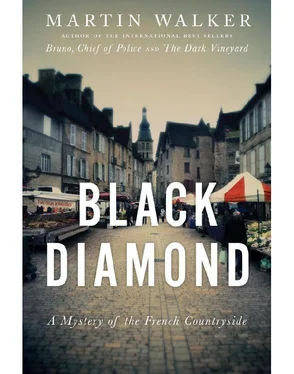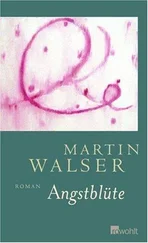Martin Walker - Black Diamond
Здесь есть возможность читать онлайн «Martin Walker - Black Diamond» весь текст электронной книги совершенно бесплатно (целиком полную версию без сокращений). В некоторых случаях можно слушать аудио, скачать через торрент в формате fb2 и присутствует краткое содержание. Жанр: Полицейский детектив, на английском языке. Описание произведения, (предисловие) а так же отзывы посетителей доступны на портале библиотеки ЛибКат.
- Название:Black Diamond
- Автор:
- Жанр:
- Год:неизвестен
- ISBN:нет данных
- Рейтинг книги:3 / 5. Голосов: 1
-
Избранное:Добавить в избранное
- Отзывы:
-
Ваша оценка:
- 60
- 1
- 2
- 3
- 4
- 5
Black Diamond: краткое содержание, описание и аннотация
Предлагаем к чтению аннотацию, описание, краткое содержание или предисловие (зависит от того, что написал сам автор книги «Black Diamond»). Если вы не нашли необходимую информацию о книге — напишите в комментариях, мы постараемся отыскать её.
Black Diamond — читать онлайн бесплатно полную книгу (весь текст) целиком
Ниже представлен текст книги, разбитый по страницам. Система сохранения места последней прочитанной страницы, позволяет с удобством читать онлайн бесплатно книгу «Black Diamond», без необходимости каждый раз заново искать на чём Вы остановились. Поставьте закладку, и сможете в любой момент перейти на страницу, на которой закончили чтение.
Интервал:
Закладка:
“I can’t say I remember, but I’ve read the history,” Bruno said.
“As you can imagine, the whole emigre community in Paris was obsessed with the war, and none more than Linh,” Bao Le said. “We were all Vietnamese patriots, but we despised the Saigon regime and hated the way the Americans fought the war. But we also detested the Communists in Hanoi. Except for Linh. She became committed to the Vietcong. She wasn’t a Communist, but she felt going back to the war was the only practical way to be a patriot.”
“She could have been right, looking back,” said Tran. “If I’d have been born then, I might have made the same decision.”
Bao Le looked at Tran thoughtfully. “Who knows?” he said. “History takes a long time to work out who was right and who was wrong. We make the best choices we can at the time. And she was very young.”
“When did she run away?” Bruno asked.
“In seventy-four, when she turned eighteen and was able to get a passport. She flew to Warsaw and then to Hanoi to volunteer for the war. The embassy in Paris had given her a visa. But when she arrived, they didn’t know what to do with her. She was a distant member of the royal family, half French and with French citizenship. They sent her to train as a nurse. We know from the handful of letters we received that she was with an army unit when they took Saigon the following year. And she was with the same unit when they were ordered into Laos and later into Cambodia. She was an outspoken critic of both those forgotten little wars, so she got into trouble and was sent to a reeducation camp.”
“A concentration camp, more like,” said Tran.
“It was a terrible place, but we, or rather our friends in Vietnam, managed to track down two people who had known her there. One was another woman, another prisoner, who told us that Linh had been raped by the guards and become pregnant and had the baby in the camp. The other, an army medic who was also a prisoner but worked in the hospital, said there was no baby, and he was sure he would have known. That’s all we have, except that Linh was released at the beginning of 1979 and sent back to the army and was killed later that year when the Chinese invaded in the border war.”
“A tragic story,” said Bruno. He didn’t know what else to say. “A nightmare for Hercule. And for you.”
“We don’t know if she had a baby, but they were all given new revolutionary names, with no indication of the mother, or the father, come to that. It was part of the way the Communists tried to abolish history. The records show that over twelve thousand babies were born in that camp, and we’ve been trying to trace them. But many of them have changed their names. I can’t say I blame them. If my name was ‘October Revolution’ or ‘Patriot Vengeance’ I’d change it too. But it’s the only plan we have, to trace as many as we
can and check their DNA.”
“How many have you been able to test so far?” Bruno asked.
“Just over three hundred.”
“Perhaps the child would have had some of its grandfather’s genes,” Bruno offered. “It might stand out.”
“Can you imagine how many Vietnamese orphans of that period had American fathers? Tens of thousands of them look Western.”
Bruno slumped into a chair, thoroughly frustrated. “Is there anything we can do?”
“We just have to keep trying. We’re even advertising. You can put notices in the Vietnamese newspapers now, and they have whole sections of people searching for family members who got separated. There are information brokers, private investigators,” said Bao Le.
He looked at his watch and then at Bruno. “You said something about catching a train. I have a car and a driver outside. We’ll get you to the station.”
23
Nicco, Bruno’s counterpart in Ste. Alvere, was waiting at Le Buisson station and looking grumpy.
“You lost your phone?” he asked. “I’ve been trying to reach you.”
Bruno dropped his hand to the familiar pouch at his waist to find it empty and then remembered the brigadier taking it from him. He had spent the journey dozing, half waking as the little train stopped at St. Emilion and Ste. Foy la Grande and chugged on its way through the vineyards of Castillon and Pomerol. Wine lovers would take this train as an act of pilgrimage. For Bruno, the endless rows of vines were comforting images of the homeland he loved, more felt than seen as he tried to catch up on his sleep.
“Sorry,” he said. “My phone’s being replaced by some fancy model that can’t be wiretapped. We’ve had some trouble that way.”
“Florence from the truffle market has been trying to reach you. Good news, she says. Something about a logbook.”
“How well do you know Didier, Nicco?”
“The market manager? Well enough. Can’t say I like him much. Is he the one behind this fraud business?”
“The logbook’ll tell us. It’s been missing.”
“So it’s an inside job, no great surprise. But how big is it? I just heard about a couple of complaints. It didn’t sound like much.”
“I won’t know until I’ve gone through all the books, but it looks pretty serious.”
“You mean there could be criminal charges?”
“That’ll be up to your mayor.” Bruno wanted to change the subject. “When did Florence call?”
“She called me a couple of times, said she couldn’t reach you. She also said she’d see you at the children’s party today, unless you want to see her sooner. I could take you to her place once we’ve picked up your car.”
“Thanks-but I’ve no idea where she lives.”
“She’s got a little place above a hairdresser’s, just a couple of rooms. Must be cramped with the kids, but she said she’d be moving to St. Denis.”
“That’s right. She’s got a new job there, teaching science at the college.”
Back in his Land Rover, Bruno followed Nicco to the small hairdresser’s shop that served the public housing project on the outskirts of town. Nicco pointed, waved and drove off, and Bruno pressed the cheap plastic button that flanked the narrow door to the upstairs apartment. He heard the sound of a distant buzzer and then steps coming down a staircase.
“Bruno!” Florence said with surprise as she opened the door, at once putting one hand to her hair, another smoothing her apron. Animated, her face had softened and become more… Bruno searched for the word. He could never call her pretty. It made her more attractive, and much less remote. “I hadn’t expected…”
“Nicco picked me up at the station and told me you’d called, about the logbook. But if this is a bad time…”
“I was just getting the children ready for a walk.” She gestured vaguely at the folding double stroller that almost blocked the narrow stairs.
“Then I’ll walk with you,” he said. “Let me get the stroller ready, and you bring the kids down.” He reached in and took the folded stroller from the hall, and with a hurried smile she nodded and went back up the stairs.
Bruno smiled to himself as he looked at his watch. Perhaps two minutes to dress the kids, another two minutes to bring them down, and the rest would be spent changing her clothes and fixing her face. Some women would keep him waiting half an hour. He suspected that Florence would be down more quickly than that. She made it, changed and hair brushed, and with the kids in overcoats and gloves and little woolen hats, in less than five minutes.
“Dora and Daniel,” said Florence. “ ‘Dora’ is short for ‘Dorothee.’ ”
Bruno knelt down to the height of the children and solemnly greeted each of them before lifting them into their seats and fastening the little seatbelts. The children were clean and cheerful and glowing with health.
Читать дальшеИнтервал:
Закладка:
Похожие книги на «Black Diamond»
Представляем Вашему вниманию похожие книги на «Black Diamond» списком для выбора. Мы отобрали схожую по названию и смыслу литературу в надежде предоставить читателям больше вариантов отыскать новые, интересные, ещё непрочитанные произведения.
Обсуждение, отзывы о книге «Black Diamond» и просто собственные мнения читателей. Оставьте ваши комментарии, напишите, что Вы думаете о произведении, его смысле или главных героях. Укажите что конкретно понравилось, а что нет, и почему Вы так считаете.












